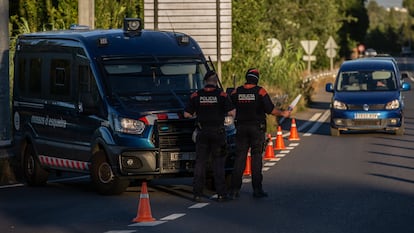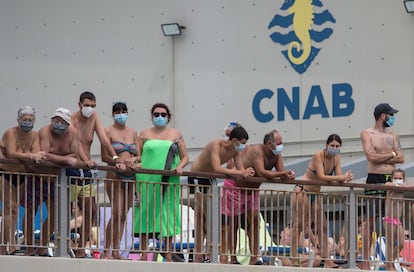Catalan premier announces decree to permit coronavirus lockdowns after judge blocks confinement order
A judicial ruling rejected the regional authorities' attempts to order citizens in the Lleida area to stay at home, given the fast-rising number of new infections in several municipalities

A judge in Lleida has annulled an order passed by the Catalan regional government to confine residents of the city and another seven municipalities in the comarca of Segrià to their homes due to rising coronavirus infections. The order instructed the 160,000 residents of the areas to remain locked down apart from if they have to work, take care of children or seniors, go to the doctors or buy food. They were also prevented from entering or leaving other municipalities unless it was for an essential activity.
The judge, however, deemed the measures to be disproportionate, pointing out that ordering such a confinement “is a state power and is exercised, what’s more, with the guarantee of the intervention of Congress,” a reference to Spain’s lower house of parliament.
The transmission of the coronavirus is now so widespread in Segrià it is difficult to trace the origin of the infections
As a result, residents of the areas in question – Lleida, Alcarràs, Aitona, Seròs, Soses, La Granja d’Escarp, Massalcoreig, Torres de Segre and the decentralized municipal entities of Sucs and Raimat – awoke on Monday to uncertainty as to whether or not they were in full lockdown once more.
But later in the day, Catalan regional premier Quim Torra announced he would be passing a decree in order to establish the conditions under which movement could be restricted due to coronavirus outbreaks. “We will always take decisions listening to the experts, even if there is resistance from some sectors,” he said at a press conference on Monday morning. The regional government also announced a €4 million plan for the affected area, in order to avoid a greater impact on the economy, Camilo Baquero reports.
The rise in coronavirus cases in the Segrià comarca – a traditional administrative division in parts of Spain – represents one of the biggest new outbreaks the country has seen since the end of the state of alarm, and forced the Catalan regional government to take drastic action. But the judge in question considered the administration to have exceeded its powers.
“The intended measures are not just disproportionate, but also are based on data and generic expressions that make such an onerous and restrictive measure as indiscriminate as it is disproportionate,” the judge wrote. The regional government could, she continued, have taken other actions such as individual confinement of the detected cases, “and a recommendation of confinement.”
A total of 1,500 coronavirus cases have been detected in Segrià since the new outbreak began
The judge also questioned the report supplied by the regional government to justify the decision, which speaks about community transmission that could be “major” in the areas in question. “There are no other data supplied, not about why it is major, whether the [situation] is extreme or severe, or on what data the existence of this dangerous community transmission is based [...].”
“We cannot understand why there can be bureaucratic obstacles for decisions that are being taken for the health of citizens,” Torra said on Monday. “It’s a luxury to be wasting time with judicial rulings. I have just spoken to the government of Lleida, who say that the situation is very calm and that people are following the recommendations of the health department and they are doing so very well.
“With respect to the situation in Lleida,” Torra continued, “we declare that we do not agree [with the judge’s decision]. I assume the consequences that may arise, but I cannot but the health of citizens at risk. This afternoon we will approve a decree that will widen and given more coverage to this resolution, which we consider to be in force. We will take all of the measures necessary for the health of citizens in accordance with epidemiological criteria, without judicial pressures.”
On July 4 the regional government took the decision to confine residents of Segrià to the area, albeit falling short of ordering them to stay in their homes. The measure has not stopped the rising number of cases, however, with 1,500 total cases in Segrià since this new outbreak began. Many are linked to agricultural companies, given that it is the fruit-picking season in the area. In just 24 hours, a further 190 cases were reported. The transmission of the virus is now so widespread it is difficult to trace the origin of the infections.
On Monday, Catalan health chief Alba Vergés said during a radio interview that the authorities were seeking judicial protection for the lockdown measures, and called on citizens to stay at home “apart from for work and essential purchases.” She also warned that the risk of coronavirus transmission in the area was high. “We are not taking these measures for fun,” she added. “We will not stop working for the health of the people.”
New cases in Catalonia
The situation in the northeastern Catalonia region is becoming more and more complicated, with a further rise in cases in the Barcelona metropolitan area over the last 12 days. The number of daily positives over the previous seven days has risen from 35 on June 29 in the area, to 138 on Friday.

Figures provided on Sunday showed that there were 816 new cases diagnosed in the entire region during the previous 24 hours, the highest number seen since the end of the state of alarm. This figure includes both positive results detected via a PCR test, i.e. an active infection, and those who have antibodies, i.e. they have had Covid-19 at an earlier time and have recovered.
The head of Preventive Medicine at the Vall d’Hebron hospital, Magda Campins, said during a radio interview at the weekend that one of the main problems the region is having is with a lack of contact tracers. “Given the outbreaks we are having we can’t just have 150 or 180 people tracing,” she said. “We need to have 2,000 to deal with the current situation and the one that is coming.”
For now, the central government in Madrid has ruled out implementing a new state of alarm in order to control the new coronavirus outbreak in Lleida. Sources from the executive stated on Monday that the country’s regional governments have tools at their disposal to deal with such situations.
When the state of alarm came to an end on June 21, all of the regions’ powers that had been recentralized during the coronavirus crisis were reinstated. It now falls to each regional government to monitor and control the epidemiological situation in their territory.
English version by Simon Hunter.
Tu suscripción se está usando en otro dispositivo
¿Quieres añadir otro usuario a tu suscripción?
Si continúas leyendo en este dispositivo, no se podrá leer en el otro.
FlechaTu suscripción se está usando en otro dispositivo y solo puedes acceder a EL PAÍS desde un dispositivo a la vez.
Si quieres compartir tu cuenta, cambia tu suscripción a la modalidad Premium, así podrás añadir otro usuario. Cada uno accederá con su propia cuenta de email, lo que os permitirá personalizar vuestra experiencia en EL PAÍS.
¿Tienes una suscripción de empresa? Accede aquí para contratar más cuentas.
En el caso de no saber quién está usando tu cuenta, te recomendamos cambiar tu contraseña aquí.
Si decides continuar compartiendo tu cuenta, este mensaje se mostrará en tu dispositivo y en el de la otra persona que está usando tu cuenta de forma indefinida, afectando a tu experiencia de lectura. Puedes consultar aquí los términos y condiciones de la suscripción digital.








































